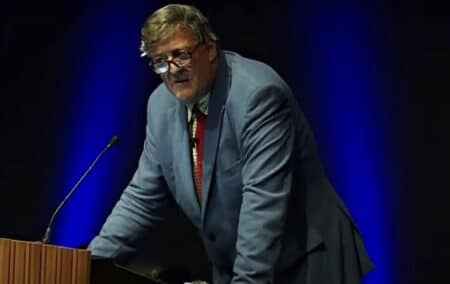It’s a little over an hour-and-a-half long, but if you can find the time for it, I assure you the rewards of watching Stephen Fry’s 2017 Shannon Luminary Lecture at the Nokia Bell Labs headquarters in Murray Hill, New Jersey is worth the effort.
For an actor, comedian, journalist, and author – he’s been referred to as a polymath, and probably justifiably – Fry’s topic on this occasion seems unlikely, hinted at in opening remarks in which he confesses that, ‘despite a lifetime immersing myself in what I consider the provoking, beguiling, bewitching and often befuddling joy of technological development … I am no computer scientist, no coder, no programmer’.
He urges his audience of very clever tech people to ‘take this as the offering of a curious mind … curious in both senses; avid for information, and a bit odd’.
Fry’s self-deprecation is the nicest possible conceit; the lecture is a spell-binding survey of the tech era we are living in, and what it might mean for humanity – and this, too, in both senses of the word: the people of the world, and what it means to be human.
There’s an idea he repeats in this lecture which I had first come across in another one – Fry’s 2015 Oxford Union address, recommended to me by my brother – in which Fry dwells on the life of Oscar Wilde and its meaning to us today.
The recurring idea that crops up in both lectures is that, when it comes down to it, there are no nouns in the universe, only verbs – no things, only processes.
‘We are verbs,’ Fry insists. ‘We all happen, we are not nouns …’
Fry credits early 20th century philosopher and poet T E Hulme for this insight (and relishes several times uttering Hulme’s phrase, ‘concrete flux of interpenetrating intensities’, which he thinks – while acknowledging that, if used in an essay, it would likely earn unforgiving attention as being ‘pretentious’ – is ‘pretty cool’).
Doing words
I’m not sure when Fry first expressed his conviction in the idea of people and things being doing words rather than nouns, fixed and unchanging.
But I did come across an earlier reference, this one from 2010, from an occasion when Fry shared his thoughts with 14-year-old Eden Parris in an interview for a Radio Times feature that enabled young readers to meet their TV heroes.
In the course of the interview, Fry warned Parris about the scope of language to shape and limit people’s ambitions.
Turning again to Wilde, Fry told Parris that the great Irish writer ‘said that if you know what you want to be, then you inevitably become it. That is your punishment. But if you never know, then you can be anything. There is a truth to that. We are not nouns, we are verbs. I am not a thing — an actor, a writer — I am a person who does things — I write, I act — and I never know what I am going to do next. I think you can be imprisoned if you think of yourself as a noun.’
(Wilde’s inimitably teasing corollary of avoiding the ‘punishment’ of invariably becoming what you want to be was that, ‘if each day you are unsure of who you are and what you know, you will never become anything, and that is your reward.’)
By the time you make it to the end of Fry’s remarkable Nokia Bell Labs lecture, you might have a sense of the virtue of avoiding the fixed status of nouns, the delusion of unchanging conditions in a world that we can expect to change beyond recognition in the coming years – precisely as a consequence of the very human quest for new ways of doing things and new things to do, for creating new frontiers, and the means to reach and ultimately surpass them.
Naming, confining and limiting
Less encouraging is the persistent human affection for nouns – for naming, confining and limiting, discouraging the best imaginative endeavours, and cramping the doing words of innovation and reinvention.
I have been thinking about these things in recent days in light of various engagements with IRR critics – in the Daily Maverick, and BusinessLive – at the heart of which is the most numbing noun of our time: race. It does seem such a trifling and outdated notion against the looming canvas of possibility, and the verbal force, if you like, of the human spirit.
I was much taken some years ago by geneticist Trefor Jenkins’ conviction that the scope for exploiting racial distinctions would inevitably dwindle, and how welcome that would be (though we shall have wait a while for the rewards).
‘The future,’ he said, ‘is café latte.’
But we wouldn’t need to wait at all if we looked beyond the nouns and saw the verbs instead.
[Image: https://www.bell-labs.com/]
If you like what you have just read, support the Daily Friend

